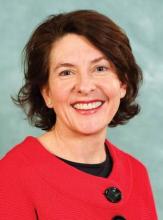SAN FRANCISCO – Stand by for some unexpected and potentially nasty surprises when the health insurance exchanges start up in 2014.
The exchanges will start enrolling patients this fall and begin sending information to patients and physicians as soon as this summer. Health insurers will begin sending new contracts to physicians at around the same time.
But there’s information available now that should send shivers up physicians’ spines, Elizabeth McNeil, vice president of the center for federal government relations at the California Medical Association, said at the annual meeting of the American College of Physicians.
A little-noticed provision of the Affordable Care Act gives exchange participants a 90-day grace period to pay their premiums. This was designed to provide a cushion for people who might not be used to paying health insurance premiums.
Insurers have to pay all claims incurred by the patient in the first month, but in the second month, if the patient is still delinquent, all claims can be held as pending. By the third month, if the patient still has not paid, the insurer can terminate him or her.
The physician then has to collect payment for all outstanding claims from the patient.
"This is going to put you at a lot of risk," Ms. McNeil said. "You’re going to have to be very vigilant with the exchange patients in watching what’s going on."
Ms. McNeil added in an interview later, "Why would a doctor sign up if they are going to be completely at risk and have to collect from the patient for the care?"
The CMA is seeking a change in the federal regulation on the grace period, which was included in the overall health insurance regulations issued in November 2012.
So far, none of the California insurers who have issued materials about their health insurance exchange plans have mentioned the grace period, Ms. McNeil said. She added that 33 health plans have said they were interested in participating in the California exchange, which is called Covered California.
Many patients who get insurance coverage through the health insurance exchanges will also have much larger out-of-pocket costs than they are used to paying, Ms. McNeil said. In California, the CMA estimates that an individual could face as much as $6,400 in uncovered expenses, and a family, up to $12,800.
Physicians also will need to pay close attention to the contracts they sign with health insurers that are participating in the exchanges. The exchange could bring a large number of new patients to the practice and physicians need to think about how many additional patients they can actually accommodate, she said.
Another thing to keep in mind: Does the contract have an all-payer clause that requires your practice to accept exchange patients? Can the practice opt in or out of a network? Many plans in California still have not determined their premiums or benefits for the exchange policies, which means they also have not set their reimbursement rates, Ms. McNeil said.
When negotiating rates, be aware that many of the patients who gain coverage via the health insurance exchanges will have pent-up demand for health care because they have previously been uninsured or underinsured, Ms. McNeil advised. Their care could be more complex and time consuming, so doctors will want to be sure that reimbursement rates are adequate to cover this care.
"There are a lot of issues here. You’re going to have to watch your practice and the big picture," she said.
On Twitter @aliciaault


